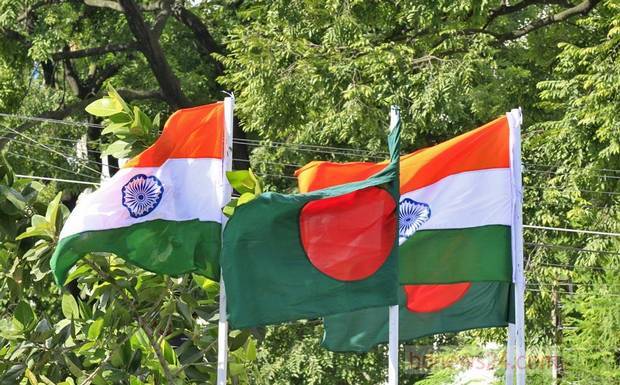
The victory of the Bharatiya Janata Party (BJP) and its leader Narendra Modi in the Indian election has created a flurry of discussions in Bangladesh on the future relationship between Bangladesh and India. As the big neighbor, Indian politics and elections always draw attention in Bangladesh; India has always been a factor in domestic politics. This time around, it has gained saliency because of the Indian role during the 5 January 2014 elections in Bangladesh. The Indian government and the ruling Indian National Congress (INC) provided unqualified support to the Awami League (AL) in holding an election without the participation of opposition parties, particularly the Bangladesh Nationalist Party (BNP). Indian policy-makers not only bought into the AL argument that the election is a necessity for constitutional continuation, but went out of their way to suggest that participation of the BNP and its allies, especially the Bangladesh Jamaat-i-Islami (BJI) may bring Islamists to power. Indian policy-makers provided an impression that the BNP victory, if it happens, would destabilize the Indo-Bangladesh relationship. The Indian foreign secretary took the trouble to travel to Dhaka and make it known to the former military dictator-turned-politician H M Ershad and by extension the entire nation. With the victory of the most significant religio-political party of the region – the BJP – many are finding it ironic that when Indian rulers were concerned about the rise of the Islamists in Bangladesh, it failed to gauge that they are going to face a devastating defeat to a non-secular party. The reasons for the defeat of the INC are manifold, and warrant a separate discussion. But for Bangladeshis, the central question has become this: will there be a change?
Thus far, the reactions from political parties and analysts have followed two diametrically opposite lines. Some are suggesting that there will be a change; even if it is not a complete reversal, there will be a course correction. Others have dismissed this line of argument pointing to the history of Indian foreign policy and its continuity through various regimes.
Listening and reading to these arguments, it appeared to me that these are ‘expectation-projections’ rather than analyses based on facts and substantive rationale. Those who are expecting the change, for example, have only one fact to support their expectation: the BJP is not the INC. The difference in ideological orientation between the INC and the BJP is the sole basis of this expectation. Proponents of this line of argument are of the opinion that the Indian policy towards Bangladesh is detrimental to Indian interests in the long-run. But they neglect to consider the fact that the relationship between these two countries in the past five years has been beneficial to India. India has practically secured almost all it wanted its neighbour to deliver without making any concessions. Undoubtedly, the relationship is lopsided in favor of India. I haven’t heard any strong argument that can convince me why the new Indian regime will disassemble this. During the election campaign Modi and his cohorts have made some highly inflammatory statements about Bangladesh; for example, all ‘migrant Bangladeshis’ will be thrown out of India or India will demand one-third of Bangladesh to accommodate the Bangladeshi Muslim migrants. Although these statements show the BJP’s hard stance, it cannot be the central plank of its policy towards its neighbor. On other unresolved issues, water sharing or land border agreements, the BJP’s position are much more stringent than the INC. Therefore, to expect that there will be an immediate course correction is likely to lead to disappointment
Those who are pointing to the continuity thesis may have more to back up their arguments. The thrust of Indian foreign policy has been consistent throughout the past half century. I have argued elsewhere, well before the election, that India follows a policy akin to the “Monroe Doctrine” in regard to its neighbor (See “The Indo-Bangladesh Relationship: Can David Re-envision Goliath?”; 2 April 2014- www.alochonaa.com). Having said that, we cannot exclude the possibility of some changes. Take for example the efforts of the BJP regime led by Atal Bihari Vajpayee to improve the relationship with Pakistan soon after he assumed office. Bilateral relationships are not entirely separate from India’s relationship with other countries, particularly the big powers. Besides, the Indo-Bangladesh relationship and India’s position on the Bangladesh election did draw flak from many countries including the United States. To suggest that the BJP will completely ignore this aspect is too simplistic a reading of the Indian foreign policy.
To comprehend the future trajectory of Indian policy towards Bangladesh, I suggest looking at the common reasons for any changes in foreign policy, particularly bilateral relations. Usually four factors influence changes in the policy towards another country under a new regime (or even under the same regime). They are: 1. the incongruence between national interests and the extant policy; 2. previously stated disagreement with the extant policy; 3. change in the political environment of the other country; 4. changes necessitated by the relationship with a third country.
In this instance, Indian policy towards Bangladesh, at least in the short term, is viewed by Indian political elites as consistent with Indian national interests. There is hardly any reason for disagreeing with it. If the BJP leadership is of the opinion that the current policy has long term implications which will be injurious to India, it will be incumbent on them to make changes.
As for the second factor, the BJP hasn’t expressed any reservations in the past years about the INC-led government’s Bangladesh policy. Unless the party wanted to remain silent until it had the power to change the policy, there is no reason to expect a change.
Thirdly, there hasn’t been any change in the domestic politics of Bangladesh since the election in January. Until a change is in the offing or takes place, there is no impetus to change course. The change might ensue from Indian domestic policies or from unforeseen political developments within Bangladesh. But as of now, it hasn’t happened.
Finally, let’s ask – will India benefit from a third country or international community if a policy change regarding Bangladesh takes place? As India’s relationship with international community will be “renegotiated”, theoretically speaking, it can happen. A party which is usually criticized as sectarian and extremist might look for an easily achievable foreign policy initiative to counter such criticism. Bangladesh could offer such an opportunity for the BJP if they wanted to take it up. Whether it will is a different matter. The BJP may wish to look for ways to demonstrate how they differ from Congress in their approach, and given the international criticism of the last government’s stance on Bangladesh, that could be one option for them to counter likely criticism of any domestic measures they may want to put in place within India. The differences between the USA and India and the European Community on this issue is well-known. But will Bangladesh be on the agenda in conversation between India and the USA and/or the EC is an open question. Even if it is, what India will gain from the change one must ask. The US pivot towards Asia, and the imminent withdrawal from Afghanistan, creates a US imperative for a renewed closer engagement between India and the US. On the Indian side, Modi’s promise of higher growth encourages it to attract US investments. Are these enough to bring Bangladesh into the mix?
Published in The Daily Star on May 21, 2014





